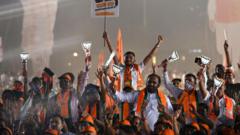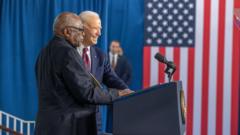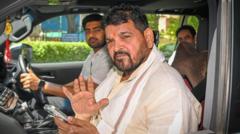The Bharatiya Janata Party (BJP) appears set for a decisive victory in Maharashtra, with trends indicating it and its allies leading in nearly 220 of the 288 available seats. This election marks the first regional contest since the parliamentary polls earlier this year, which saw Modi's government returning while losing its outright majority, relying instead on regional alliances.
Modi's BJP Poised for Victory in Maharashtra Elections

Modi's BJP Poised for Victory in Maharashtra Elections
Prime Minister Narendra Modi's party is on track to secure a commanding win in Maharashtra's recent regional elections, defining India's political landscape.
Maharashtra, home to India's financial capital Mumbai, remains a pivotal state in national politics. The BJP's forecasted retention of power here is essential for party morale following a difficult electoral season. Spokesperson Pravin Darekar expressed surprise at the scale of support for the BJP, emphasizing that while a win was expected, the overwhelming outcome was beyond their anticipation.
Modi's campaign focused heavily on welfare programs targeted at farmers, a crucial demographic considering the state's significance in agricultural production. The opposition, led by the Congress party, mirrored these promises with commitments for farm loan waivers and aid for vulnerable populations. However, this competition over promises raises concerns over the fiscal sustainability of new initiatives, as both parties seek to appease an electorate weary from recent political upheaval.
Recent political volatility in Maharashtra stemmed from defections by lawmakers from regional parties, the Shiv Sena and the National Congress Party (NCP), who joined the BJP-led coalition. On the other hand, in Jharkhand, the BJP's prospects seem dim as the main opposition party gains ground amid allegations of corruption against the state chief minister, adding layers of complexity to India's political narrative.
Both states present a microcosm of India's larger electoral battles, showcasing how welfare promises and political alliances evolve in the face of fluctuating public sentiment. As the results finalize, the implications for governance and economic strategy will come into sharper focus.
Modi's campaign focused heavily on welfare programs targeted at farmers, a crucial demographic considering the state's significance in agricultural production. The opposition, led by the Congress party, mirrored these promises with commitments for farm loan waivers and aid for vulnerable populations. However, this competition over promises raises concerns over the fiscal sustainability of new initiatives, as both parties seek to appease an electorate weary from recent political upheaval.
Recent political volatility in Maharashtra stemmed from defections by lawmakers from regional parties, the Shiv Sena and the National Congress Party (NCP), who joined the BJP-led coalition. On the other hand, in Jharkhand, the BJP's prospects seem dim as the main opposition party gains ground amid allegations of corruption against the state chief minister, adding layers of complexity to India's political narrative.
Both states present a microcosm of India's larger electoral battles, showcasing how welfare promises and political alliances evolve in the face of fluctuating public sentiment. As the results finalize, the implications for governance and economic strategy will come into sharper focus.






















